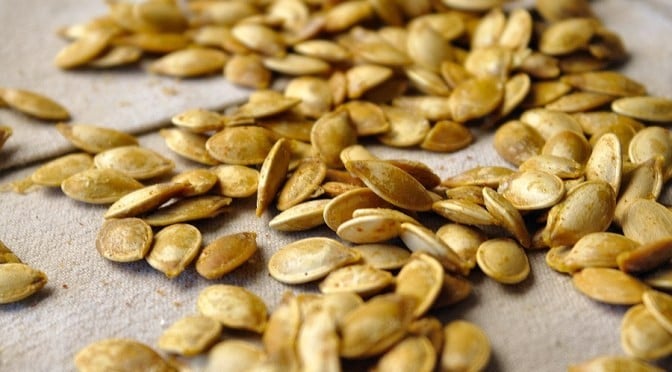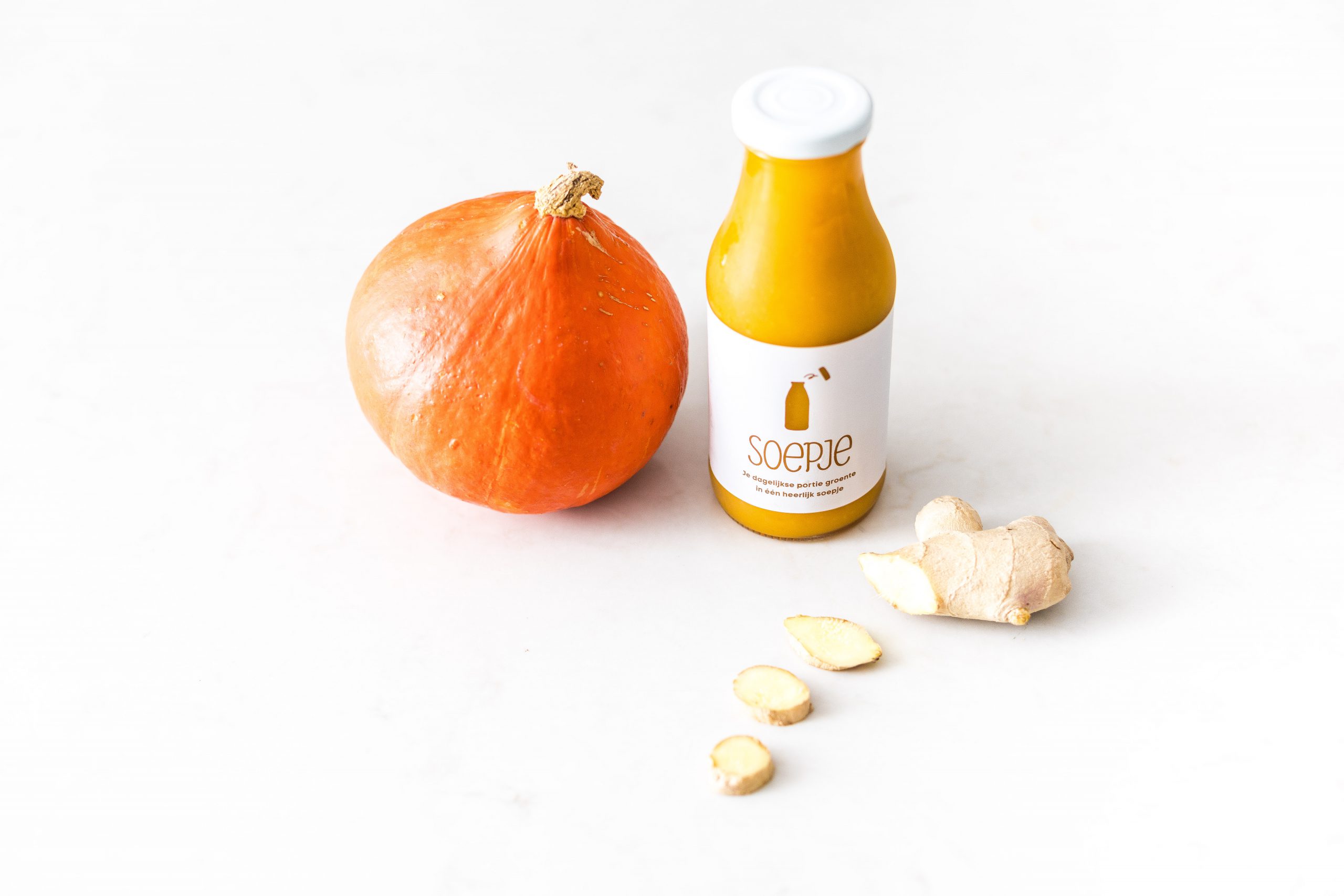For many people, a bowl of hearty pumpkin soup is primarily known as comfort food. But did you know that pumpkin soup can also be considered a superfood? This large, orange fruit is rich in vitamins, minerals, and antioxidants.
Pumpkin has a long history as a popular food for humans. For thousands of years, this large fruit has been cultivated and enjoyed with gusto. Initially, pumpkin was primarily consumed in Central and South America, but since the sixteenth century, it has also become part of the European diet.
It’s possible that people have long known that pumpkin, besides being delicious, is also very healthy. In recent decades, there has been increasing scientific evidence to support this. In this article, we’ll outline some proven health benefits of pumpkin (soup) and explain which nutrients are responsible for these benefits.
After reading this article about the health benefits of pumpkin soup, if you can’t wait to enjoy a fresh bowl of this orange wonder food, you can immediately start with the delicious pumpkin soup recipe at the bottom. You can also easily order a soup cleanse from Sapje.
Continue reading to discover 7 impressive health benefits of pumpkin soup. We’ll tell you, for example:
- How pumpkin soup supports your immune system
- Why pumpkin soup is good for your skin
- How pumpkin soup is beneficial for your iron levels
- Why pumpkin soup contributes to good vision
- How pumpkin soup supports your brain
- How pumpkin soup is good for your heart
- Why pumpkin soup promotes your energy metabolism
What nutrients make pumpkin soup so healthy?
Pumpkin (botanical name: cucurbita) belongs to the Cucurbitaceae family, which also includes cucumbers, zucchinis, and watermelons, among others. Pumpkins come in various types, some of which are edible, and others (like gourds) are not. The round, orange pumpkin that you can easily find in Dutch supermarkets is very suitable for making pumpkin soup. This also applies to butternut squash.
An average pumpkin consists of about 94 percent water, making it not a calorie bomb. A 250-milliliter serving of pure pumpkin soup contains only 78 calories. Thanks to a decent amount of fiber, pumpkin soup is satisfying and filling. Moreover, pumpkin is rich in various healthy nutrients. Some of these, such as various types of carotenoids found in pumpkin, become more absorbable when cooked (1).
A portion of our pumpkin soup contains:
- Vitamin A: 781 μg, 98% of recommended daily intake
- Vitamin C: 27 mg, 34% of recommended daily intake
- Copper: 0.3 mg, 30% of recommended daily intake
- Vitamin K: 20 μg, 27% of recommended daily intake
- Vitamin B1: 0.28 mg, 25% of recommended daily intake
- Manganese: 0.5 mg, 25% of recommended daily intake
- Potassium: 467 mg, 23% of recommended daily intake
- Iodine: 34 μg, 23% of recommended daily intake
- Folic acid: 39 μg, 20% of recommended daily intake
- Vitamin E: 2.2 μg, 18% of recommended daily intake
- Vitamin B5: 0.9 mg, 15% of recommended daily intake
- Magnesium: 51 mg, 14% of recommended daily intake
- Vitamin B6: 0.15 mg, 11% of recommended daily intake
- Calcium: 81 mg, 10% of recommended daily intake
- Phosphorus: 73 mg, 10% of recommended daily intake
- Vitamin B3: 1.5 mg, 9% of recommended daily intake
- Iron: 1.2 mg, 9% of recommended daily intake
- Vitamin B2: 0.04 mg, 3% of recommended daily intake
And smaller amounts of various other vitamins and minerals.
1. Pumpkin soup supports your immune system
Carotenoids in pumpkin soup
When you look at the impressive list of vitamins and minerals found in pumpkin, the amount of vitamin A probably stands out the most. You read that correctly: with 245 grams of cooked pumpkin, you get more than twice the recommended daily amount of vitamin A! This is thanks to the large amounts of carotenoids found in pumpkin, such as beta-carotene, alpha-carotene, cis-beta-carotene, lutein, lycopene, and zeaxanthin. Beta-carotene is the most abundant carotenoid in pumpkins compared to the other carotenoids. Our bodies convert this compound into vitamin A (2).
Vitamin A and your immune system
Many of the health benefits of pumpkin for various processes in the body are attributed to these carotenoids. But let’s start with beta-carotene/vitamin A. Vitamin A helps your immune system. Additionally, this vitamin is good for the mucous membranes in your body, such as your skin, lungs, and intestines. Your mucous membranes form an important protective barrier against unwanted substances in your body. Vitamin A is also good for your eyes and enhances the availability of iron from your body’s stores. As if that’s not enough, pumpkin soup also contains significant amounts of vitamin C, a nutrient that also contributes to maintaining a strong immune system.

2. Pumpkin soup is healthy for your skin
Beta-carotene as skin care
In addition to supporting your immunity, vitamin A (in the form of beta-carotene) in pumpkin soup also benefits your skin. Research shows, for example, that vitamin A contributes to the skin’s regenerative capacity, helping to maintain the normal structure and function of your skin. Regularly eating pumpkin soup is a contribution to nourish your skin from the inside out.
Vitamin C for sun protection
Another vitamin that is well-represented in a bowl of pumpkin soup is vitamin C. Vitamin C has more functions than just supporting your immune system. One of its crucial roles is to help your body neutralize free radicals. These are unstable substances that can damage healthy cells and tissues, a condition known as oxidative damage. External factors such as air pollution and UV radiation from sunlight can promote the formation of these free radicals, causing damage, especially to your skin. By getting enough antioxidants, like vitamin C, through your diet, you can help protect your skin from the inside against the sun.
As if that’s not enough, you’ll also find a fair amount of vitamin E in pumpkin soup. This antioxidant is also known for its protective effects against sunlight. Together, vitamins A, C, and E form an ideal combination to keep your skin healthy. That’s why pumpkin soup could almost be called a beauty food!
Vitamin C for collagen production
Vitamin C is also crucial for collagen production in your body (3). Collagen is an important structural protein in your skin’s connective tissues that supports skin firmness, among other things. Therefore, vitamin C helps strengthen your skin from within. Collagen also plays a significant role in your bones and cartilage.
3. Pumpkin soup enhances your iron absorption
The generous amounts of vitamins A and C found in pumpkin soup have an effect on the iron levels in your blood. Vitamin A is beneficial for the iron metabolism in your blood, while vitamin C influences the absorption of iron in your blood. Iron is involved in the formation of red blood cells and hemoglobin in your body, contributing to the normal transport of oxygen in your body. Because vitamins A and C promote the absorption of iron from your diet, they help increase the iron levels in your blood.
4. Pumpkin soup is good for your vision
You’ve probably heard someone (maybe your grandma or mom) say that eating carrots is good for your eyes. That’s true, and the same applies to eating pumpkin soup! Both carrots and pumpkin have a bright orange color, caused by the carotenoids present in both. Some of these, particularly beta-carotene, are converted into vitamin A in the body. Vitamin A is known for its support of your vision. It helps you see clearly in the dark and maintains the normal moisture balance in your eyes.
5. Pumpkin soup supports your brain
Did you know that the vitamin C in pumpkin soup also contributes to various brain functions? This vitamin, among other things, enhances your concentration, memory, and learning abilities. So, be sure to enjoy a delicious bowl of pumpkin soup when studying for an important exam or during a busy (home)workday!
6. Pumpkin soup for your heart and blood vessels
Our organic pumpkin soup is also an excellent source of vitamin B1. This is convenient because this vitamin can support your heart’s function. Additionally, the ample amount of potassium in pumpkin soup can help maintain your blood pressure, and vitamin C contributes to the preservation of strong and flexible blood vessels. Together, these three nutrients form a nice combination to provide extra support for your heart and blood vessels.
7. Pumpkin soup supports your energy metabolism
Have you ever noticed that pumpkin soup is often thick and fibrous? Thanks in part to those fibers, pumpkin soup is quite nutritious. Moreover, the vitamins B1 and C in pumpkin soup promote your energy metabolism, supporting your energy levels. Below is a delicious recipe for a tasty and naturally super-healthy pumpkin soup that will keep you satisfied for a while!

Make it yourself: Antioxidant-rich pumpkin soup recipe with a kick
Would you like to make fresh pumpkin soup yourself? That’s an excellent way to benefit from the many health benefits of pumpkin soup. Preparing a pumpkin can be a bit of a task, but fresh pumpkin soup is generally much richer in healthy nutrients than store-bought pumpkin soup. Plus, it tastes better! Below, you’ll find an easy recipe for pumpkin soup with additional antioxidant-rich additions, such as sweet potato, tomato, bell pepper, and various spices.
How to make your pumpkin soup recipe even healthier
In addition to pumpkin, this recipe includes other healthy ingredients. This significantly increases the already impressive amount of antioxidants in pumpkin soup. Sweet potato, for example, provides extra beta-carotene and a creamier texture. Thanks to the tomatoes, you get a good dose of lycopene, among other things. Cooked tomatoes also contain abundant antioxidants like vitamin C and E.
On top of that, there is plenty of vitamin C in bell peppers. So, this soup is an excellent supporter for your immune system. Ingredients like onions, garlic, cinnamon, cayenne pepper, chili powder, and turmeric also contribute to the nutritional value. Black pepper helps your body absorb beta-carotene and curcumin from turmeric, among other functions. Ideally, add a dash of olive oil to the soup. This also improves the absorption of beta-carotene, as shown by research (4). Cooking and puréeing your pumpkin for this soup also enhance the absorption of this nutrient. That’s how you can make a healthy soup!
With this easy recipe, you can make about 4 servings of fresh pumpkin soup. So, you can enjoy it multiple times or share it with others. Freeze a portion for later if you like. It’s an excellent way to naturally preserve freshness and valuable nutrients.
Ingredients for your pumpkin soup (4 servings)
- 500 grams of organic pumpkin
- 400 grams of tomatoes (e.g., Roma)
- 1 sweet potato
- 1 red bell pepper
- 2 onions
- 2 cloves of garlic
- ¼ teaspoon of chili powder
- ¼ teaspoon of cayenne pepper
- ½ teaspoon of cinnamon
- 1 teaspoon of organic paprika powder
- 1 liter of water
- Sea salt/Himalayan salt or herbal salt to taste
Preparation:
- Peel and chop the onions.
- Peel and finely chop the garlic.
- Rinse the pumpkin. Cut it in half and remove the seeds (you can save these to roast and serve with the soup if you like; see the extra tip below). Cut the pumpkin into smaller cubes.
- Wash the tomatoes and cut them into wedges.
- Wash the bell pepper, remove the seeds and stems, and cut it into small pieces.
- Bring 1 liter of water to a boil.
- Sauté the onions and garlic in some oil.
- Add the onions, garlic, pumpkin, and bell pepper to the boiling water.
- When the pumpkin is almost soft enough to purée, add the tomatoes.
- Purée the mixture until you have a thick soup without lumps.
- Do not let the soup boil anymore, but keep it hot on low heat.
- Add turmeric, cayenne pepper, chili powder, paprika powder, and cinnamon.
- Season with pepper and sea salt/Himalayan salt or herbal salt.
- Add a splash of olive oil.
- Enjoy!

Extra tip: Roasting pumpkin seeds!
Did you know that pumpkin is officially classified as a fruit because pumpkins have seeds? These pumpkin seeds are also edible. They are delicious and nutritious, just like the fruit itself. You can buy them in the store, but be sure to save them when you make your own pumpkin soup. Boil them briefly and then roast them to make delicious and healthy snacks! Pumpkin seeds are rich in healthy fats and minerals like magnesium and zinc. If you leave the white shells on, you’ll also get a good amount of healthy fiber.
Here’s how to roast pumpkin seeds:
- Remove any remaining flesh.
- Boil the seeds for 15-20 minutes in a pan of salted water.
- Preheat your oven to 200 degrees Celsius.
- Place the pumpkin seeds on a baking sheet without parchment paper, making sure there is enough space between the seeds.
- Roast the pumpkin seeds for another 15-20 minutes in the oven, optionally adding some salt.
No time to make your own pumpkin soup?
Is making your own pumpkin soup too time-consuming for you? Then you can, of course, order pumpkin soup. Our organic pumpkin soup contains nothing but the best from healthy, local ingredients, such as natural pumpkin, sweet potato, carrot, ginger, coriander, and cumin.
Order it online easily and specify when we can deliver the pumpkin soup to your home. Choose the most convenient time for you when checking out. We will then come by with the freezer truck and deliver the pumpkin soup to you in frozen condition.
By freezing our products, we can naturally preserve their freshness and valuable nutrients without the need for other preservatives! All you need to do after receiving it is let the soup thaw and then heat it in a pan. That’s how easy it can be to enjoy delicious, fresh, and, most importantly, healthy pumpkin soup!

